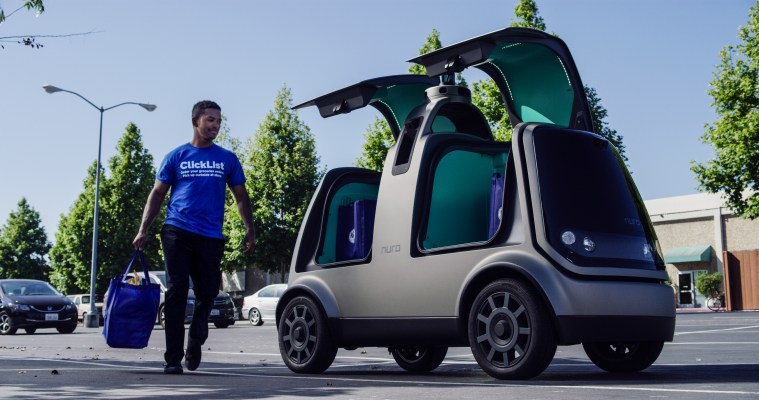
Autonomous delivery startup Nuro is allowed to launch commercial driverless services on public roads in California — the first company to clear this hurdle — after receiving a permit from the state’s Department of Motor Vehicles.
Nuro, which was founded in June 2016 by Google alums Dave Ferguson and Jiajun Zhu, plans to start commercial delivery operations early next year. The so-called Autonomous Vehicle Deployment permit will allow Nuro to operate commercial services — meaning it can charge for delivery — in San Mateo and Santa Clara counties. The intention is to start with its autonomous Toyota Prius vehicles in one city and one partner in the early part of 2021, Nuro’s chief legal and policy officer David Estrada said. The company will eventually transition to its purpose-built R2 delivery bots for its commercial service as well as add more partners and expand geographically.
While Nuro wouldn’t name the partner or city, it’s worth noting that the company is headquartered in Mountain View and has previously expressed a desire to start operations close to its main office.
“Issuing the first deployment permit is a significant milestone in the evolution of autonomous vehicles in California,” DMV Director Steve Gordon said in a press release issued Wednesday. “We will continue to keep the safety of the motoring public in mind as this technology develops.”
The deployment permit grants Nuro permission to use a fleet of light-duty driverless vehicles for a commercial delivery service on surface streets within designated parts of Santa Clara and San Mateo counties, which includes the cities of Atherton, East Palo Alto, Los Altos Hills, Los Altos, Menlo Park, Mountain View, Palo Alto, Sunnyvale and Woodside, according to the DMV. The vehicles have a maximum speed of 25 mph and are only approved to operate in fair weather conditions on streets with a speed limit of no more than 35 mph.
The announcement caps a milestone year for Nuro, which earlier Wednesday announced it had acquired self-driving trucks startup Ike Robotics. Nuro also raised another $500 million, which pushed its post-money valuation to $5 billion, and secured some key state and federal regulatory victories.
Nuro has followed a long and winding path to secure the deployment permit. In 2017, the California DMV, the agency that regulates autonomous vehicles in the state, issued Nuro an AV testing permit that required the company to have a human back up driver behind the wheel. Initially, the company used modified Toyota Prius sedans for testing as well as for pilot grocery deliveries in Arizona and Texas.
The company transitioned in December 2018 to the R1, the first step toward a vehicle designed exclusively for packages. Its second-generation, vehicle called the R2, was introduced in February 2020. The R2, which was designed and assembled in the U.S. in partnership with Michigan-based Roush Enterprises, is equipped with lidar, radar and cameras to give the “driver” a 360-degree view of its surroundings. Importantly, Nuro received a driverless exemption from NHTSA for its R2 vehicle. The exemption allows the vehicle to operate even though it doesn’t have side-view mirrors, a windshield and a rear-view camera that shuts off when driving forward.
Nuro received in April 2020 a permit from the CA DMV to test driverless vehicles, which meant it could finally put its R2 delivery bots on public roads. While dozens of companies have an active permit with the CA DMV to test autonomous vehicles with a human safety driver, AutoX, Cruise, Nuro, Waymo and Zoox are the only companies allowed to test driverless vehicles on California’s public roads.
Still, Nuro wasn’t able to charge for delivery until it received the deployment permit that was issued Wednesday.
Nuro has a slightly cleaner path to commercial operations than autonomous vehicle companies aiming to shuttle people in robotaxi-type operations. Commercial ride-sharing services using driverless vehicles also have to secure permits from the California Public Utilities Commission to be able to shuttle passengers. Another additional permit by the CPUC is required to charge for rides.
Getting permission to charge for rides wasn’t even possible until last month. The CPUC approved in November two new programs to allow permitted companies to provide and charge for shared rides in autonomous vehicles. The automated vehicle technology industry had lobbied the CPUC for months to consider the rule change that would allow for operators to charge a fare and offer shared rides in driverless vehicles. While the decision was widely cheered, some in the industry have warned that the approval process could further delay commercial robotaxi operations.
Potential robotaxi operators have to receive the proper permits from the CPUC and the California DMV as well as meet several reporting requirements. Participating companies also have to submit a safety plan and quarterly reports to the CPUC with aggregated and anonymized information about the pickup and drop-off locations for individual trips, the availability and volume of wheelchair accessible rides, service levels to disadvantaged communities and supply data such as the fuel type used by the vehicles, miles traveled and passenger miles traveled.



